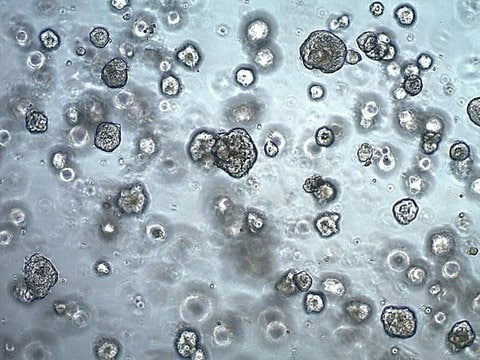CLLS1132
DLD1 CELLS AKT1 -/-
human male colon (Source Disease: Colorectal adenocarcinoma)
Sign Into View Organizational & Contract Pricing
All Photos(1)
About This Item
UNSPSC Code:
41106514
NACRES:
NA.81
Recommended Products
General description
DLD1 Cells SMAD4 -/- are colorectal adenocarinoma, epithelial cells, from a human adult male, with a ZFN knock out modification.
This product corresponds to ATCC Cat. No. CCL-221.
This product corresponds to ATCC Cat. No. CCL-221.
Application
Media Renenewal changes two to three times per week.
Rapidly thaw vial by gentle agitation in 37°C water bath (~2 minutes), keeping vial cap out of the water. Decontaminate with 70% ethanol, add 9 mL culture media and centrifuge 125 x g (5-7 minutes). Resuspend in complete culture media and incubate at 37°C in a 5% CO2 atmosphere.
Subculture ratio: approx. 1:3 to 1:10.
The base medium for this cell line is RPMI, Cat. No. R5886. To make the complete growth medium, add the following components to the base medium: fetal bovine serum, Cat. No. F4135, to a final concentration (v/v) of 10%, L-glutamine, Cat. No. G7513, to a final concentration of 2 mM and sodium pyruvate, Cat. No. S8636, to a final concentration of 1 mM.
Cell freezing medium-DMSO 1X, Cat. No. C6164.
Rapidly thaw vial by gentle agitation in 37°C water bath (~2 minutes), keeping vial cap out of the water. Decontaminate with 70% ethanol, add 9 mL culture media and centrifuge 125 x g (5-7 minutes). Resuspend in complete culture media and incubate at 37°C in a 5% CO2 atmosphere.
Subculture ratio: approx. 1:3 to 1:10.
The base medium for this cell line is RPMI, Cat. No. R5886. To make the complete growth medium, add the following components to the base medium: fetal bovine serum, Cat. No. F4135, to a final concentration (v/v) of 10%, L-glutamine, Cat. No. G7513, to a final concentration of 2 mM and sodium pyruvate, Cat. No. S8636, to a final concentration of 1 mM.
Cell freezing medium-DMSO 1X, Cat. No. C6164.
Biochem/physiol Actions
AKT serine/threonine kinase 1 (AKT1) acts as a regulator for cell-survival and anti-apoptotic actions, which are involved in development of various cancers. This protein has a crucial role in tumorigenesis. In mice, AKT1 is essential for normal development. Mutations in the gene are associated with the pathogenesis of prostate cancer (PC). Elevated expression of the gene has been observed in human gastric cancer. Aberrations in the AKT1 and glycogen synthase kinase 3 (GSK3)-β signaling leads to the development of schizophrenia.
Features and Benefits
These DLD-1 cells are adherent, with a doubling time of approx. 20 hours.
Zinc finger nuclease (ZFN) knock out on chromosome 14q32.3
Zinc finger nuclease (ZFN) knock out on chromosome 14q32.3
Quality
Tested for Mycoplasma, sterility, post-freeze viability, short terminal repeat (STR) analysis for cell line identification, PCR assay for cell line species confirmation.
Disclaimer
RESEARCH USE ONLY. This product is regulated in France when intended to be used for scientific purposes, including for import and export activities (Article L 1211-1 paragraph 2 of the Public Health Code). The purchaser (i.e. enduser) is required to obtain an import authorization from the France Ministry of Research referred in the Article L1245-5-1 II. of Public Health Code. By ordering this product, you are confirming that you have obtained the proper import authorization.
Kit Components Only
Product No.
Description
- DLD1 CELLS AKT1 -/-
Certificates of Analysis (COA)
Search for Certificates of Analysis (COA) by entering the products Lot/Batch Number. Lot and Batch Numbers can be found on a product’s label following the words ‘Lot’ or ‘Batch’.
Already Own This Product?
Find documentation for the products that you have recently purchased in the Document Library.
Association between single nucleotide polymorphisms in AKT1 and the risk of prostate cancer in the Chinese Han population.
Liu JM, et al.
Genetics and molecular research : GMR, 16(1) (2017)
Convergent evidence for impaired AKT1-GSK3β signaling in schizophrenia
Emamian ES, et al.
Nature Genetics, 36(2), 131-131 (2004)
Akt1/PKBalpha is required for normal growth but dispensable for maintenance of glucose homeostasis in mice
Cho H, et al.
The Journal of Biological Chemistry, 276(42), 38349-38352 (2001)
AKT plays a central role in tumorigenesis
Testa JR and Bellacosa A
Proceedings of the National Academy of Sciences of the USA, 98(20), 10983-10985 (2001)
Our team of scientists has experience in all areas of research including Life Science, Material Science, Chemical Synthesis, Chromatography, Analytical and many others.
Contact Technical Service




